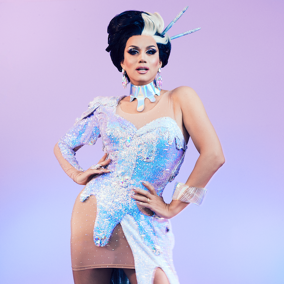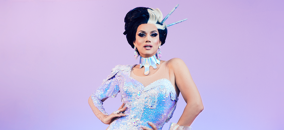
Actor Billy Porter revealed last year he was HIV-positive. He’d been living with the virus for 14 years. Porter said one of the reasons he didn’t talk publicly about it sooner was that he didn’t want his mom to know.
“I didn’t want to put her through that,” he explained.
Porter say he was “Embarrassed … ashamed … I was the statistic that everybody said I would be.”
HIV infections have fallen in recent years. In the US, they declined 73% between 1984 and 2019. This is largely due to PrEP use and the wonders of effective treatment ensuring people become HIV undetectable. Once undetectable for the virus, HIV-positive individuals can’t pass it on.
How about we take this to the next level?
Our newsletter is like a refreshing cocktail (or mocktail) of LGBTQ+ entertainment and pop culture, served up with a side of eye-candy.
However, it means some folk now forget that HIV is still an issue or that people are still acquiring the virus and having to grapple with how to tell loved ones.

Porter finally decided to tell his mom while he was shooting the third season of Pose. His character, Pray Tell, had HIV. He said playing the role helped him work through some of his feelings of shame.
Porter recalls the conversation and how it played out.
“She said, ‘You’ve been carrying this around for 14 years? Don’t ever do this again. I’m your mother, I love you no matter what.’”
Related: 10 inspiring queer celebrities who told the world about thriving with HIV
Porter’s hesitation is one that many people with HIV relate to. Of all the people one chooses to share one’s status with, telling parents can count among the hardest.
Alex Sparrowhawk
Alex Sparrowhawk, 37, knows this all too well. He lives in Manchester, England, and was diagnosed with HIV in 2009.
The news came as a shock to the then-24-year-old. He said it took him some time to get his head around it. He told some close friends soon after.
“And then, about three months after my diagnosis, I met someone who, luckily for me, wasn’t fazed by HIV and was really understanding. We were together a number of years, so I had his support.”
However, telling his parents was another matter. Alex says he waited two and a half years before informing his mom.
Alex said he worried about “letting [his parents] down” and not wanting them to worry. He says his sister was also due to get married, “and I didn’t want to throw this bombshell into the family.”
His parents lived in the London suburbs. His mom arranged a visit to Manchester. Alex says not telling her was eating away at him. He decided the time was right to tell her.
“It had got to a point where it was really playing on my mind,” he says. “We made an excuse to go to my boyfriend’s flat. And he just kind of left us to it. I said, ‘There’s something I want to talk to you about.’ And then I just explained the situation.
“By that point, what was worrying me more and stressing me out was I had waited so long to tell her. I think that was playing on my mind more so than the virus itself.
“At the same time, I was worried mum was going to over-worry and stress about me. But I’d had a couple of years of living with HIV, and I knew my health was in a good place.”
Offering reassurance and information about HIV
Alex says telling his mom was inevitably emotional. However, after reassuring her that HIV is now a manageable condition and that he would likely have a normal life expectancy, her main concern was the length of time it took him to tell her.
“Mum was worried I hadn’t told her sooner, and whether she had done anything to stop me telling her. But it was all my decision and my concerns. Mum’s always been there for me, and she was worried I’d been dealing with it on my own. Obviously, I hadn’t because I had people around me.”
Mom’s side of the story
Lorraine says she knew Alex was gay from a young age. It was no surprise to her when he came out, a few months before heading to university.
Alex was born in 1987. At the time, the AIDS epidemic was prompting a moral panic in the media. The UK government launched an infamous, rather grim campaign, urging people not to die of ignorance. A TV advert featured the word “AIDS” engraved on a giant tombstone.
Lorraine remembers it well. She says that when Alex shared the news of his status, some of her knowledge of HIV was still rather rooted in the 80s.
“When Alex did tell me, I suppose I was quite shocked. It wasn’t what I was expecting him to say. I suppose [HIV] had been there in the background but it wasn’t in the forefront of my mind,” she recalls.
Lorraine says she was aware that progress had been made with medication.
“Alex’s dad had worked in the pharmaceutical industry, so I was aware of the improvements in drug therapy, so I suppose I was more aware than some people would have been.”
Nevertheless, her initial reaction was shock and fear.
“I was frightened for Alex,” she says. “As in ‘how is this going to affect his life? Will he be unwell?’ Although Alex, one of the first things he told me was, ‘It’s OK. I will have a normal lifespan. I have medication. I’m going to be alright.’
“It took a while for it to sink in. I started doing a little bit of investigating myself. Alex pointed me in the direction of places I could go for information.”
Telling the rest of the family about his HIV status
Neither have any regrets about having the conversation. After his mom, Alex told his younger sister and his dad. Both were supportive. Alex says his dad (who died a couple of years ago), drew on his pharmaceutical knowledge.
“He came about it in a more clinical, slightly medicalized way,” remembers Alex. “We were having conversations and we were talking about private healthcare and things like that, and I was saying, ‘I’m fine, the care I’m getting from the [NHS] clinics is all working, I’m healthy.’ But that was his way of approaching it.”
Alex went on to make a public announcement on Facebook, so everyone in his extended family found out. He now works for the Terrence Higgins Trust, the UK’s largest sexual-health charity.
Is Alex’s HIV status something Lorraine worries about on a day-to-day basis?
“I’d say at the beginning it was more on your mind,” she says. “Now, I don’t think about it so much. I mean, Alex has always been Alex. It makes no difference.
“It’s the little things. If I know Alex is not well, and during Covid, I was a little more worried. Those things still play on my mind a little bit.
“But it’s not on my mind constantly, and when I see Alex on the TV or on the radio, I’m just hugely proud of who he is and what he does.”
How best to reveal your HIV news to loved ones
There’s no rule stating you have to inform your parents you’re HIV-positive. However, there is research that points to the benefits of sharing information.
“Some studies noted that disclosure was positively associated with the access to healthcare, medical adherence, safer sex practices, and most positive social outcomes,” says Emma Jackson, a licensed counselor and President of Unicorn Health, LLC, based in Washington DC.
All sexually active gay men are advised to have an HIV test at least once a year, or more often if they have multiple partners. Some insurers will require you to have a test every three months to obtain PrEP.
In 2020, almost 21,000 men in the US were diagnosed with HIV acquired through gay sex. Many then faced the dilemma of when or how to tell those close to them.
What advice would Alex have for anyone who wants to tell their family?
“I think it’s about trusting your gut and the relationship you have. Make your decision based on that. I think it’s also good to have a plan in your head: If it goes well, great. But if it doesn’t, how do I react?”
Justin D’Avella (PsyD) is a Senior Clinical Director at Two Chairs, a therapy service treating clients in California and Washington.
“Share in person, in a setting where you feel comfortable,” D’Avella suggests.
“Use simple language and be direct. Minimize factors that can contribute to a negative response, such as alcohol consumption or stressful family holidays.
“Have a check-in scheduled with your support system after you speak with them. Consider having a supportive family member present.
“Be explicit in what you are hoping for (for example, “I have something I want to share. I am hoping you will listen and tell me you love me afterward.”),” D’Avella adds.
“Be prepared to address urgent concerns and correct misconceptions. Ask them to keep your status confidential. Lastly, remember this is first and foremost your diagnosis you’re sharing with them. Set boundaries that are important for you and your mental health. You can say, ‘I am not open to answering any more questions today but we can make time soon to answer your questions.”
Alex notes, “There’s that added awkwardness that 99% of us likely got HIV through unprotected sex, and there’s all that added layer of talking about that. No one wants to talk about sex with their parents.”
Mom and dad may well want to know how you acquired HIV. If you don’t want to discuss that, don’t feel pressured to do so.
Emma Jackson says a face-to-face conversation is best. However, if you have concerns it could go badly, “other forms of communication can offer their own benefits”, such as sending a letter first and then following it up with a face-to-face or video conversation.
Alex has spoken to many people with HIV, many of whom have struggled to talk to their families.
“Ultimately, it’s up to you whether you want to share that information,” he says. “Some people can process it in a very practical, medical way. They see it as a condition that’s not greatly impacting their life” and not something they need to share with their family. “That’s perfectly fine as well.”
However, for some, “not telling loved ones will eat at them.”
“I try to tell people, try not to treat it as a secret,” says Alex.
“I think when you’re keeping something from your family, it can play on your mind, and it can feel like you’re not being honest with them. That’s really what led to me eventually having that conversation with mum.”












































